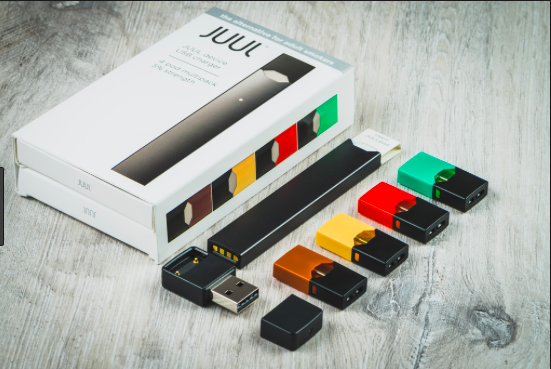
A relatively obscure city committee will make what some say is a crucial decision tomorrow on a ballot measure that would overturn the city’s ban on those nicotine-delivery systems– which are known as vaping devices or electronic cigarettes, depending who you ask.

The distinction is important: The language that the Ballot Simplification Committee wants to put in the ballot handbook uses the term “electronic cigarettes.” Juul Labs, the company that makes the devices that have now hooked tens of thousands of teens on nicotine, wants the use the word “vaping,” which presumably doesn’t sound as bad.
That’s just one of the long list of issues that will be debated as Juul’s team tries to change the words that every voter will see before they cast their ballots. The language in the ballot handbook can be critical, particularly for voters who don’t pay attention to the campaign literature and ads and who look at what the city says the measure would actually do.
San Francisco voters are not fond of “cigarettes,” and have approved over the years numerous bills to tax and regulate them. Not as many people – particularly people over 40 – even know what “vaping” is.
The supes unanimously passed legislation banning Juul devices from being made or sold in San Francisco. Juul, now partially owned by Altria, the giant tobacco conglomerate, hired signature gatherers to put a measure on the ballot that would repeal the law.
The argument from the tobacco industry: Juul is good for adults who want to shift from smoking to vaping, which might not be as bad for you. And why should San Francisco ban adults from using a drug (nicotine) of their choice when the city has long supported adult use of drugs like alcohol and cannabis?
But we aren’t talking just about adults here. The argument from the supes and their allies: Juul aggressively marketed to kids with all sorts of flavored tobacco, got another generation addicted to nicotine just as we were winning the war on youth smoking, and these devices will continue making their way into the high schools where (trust me, I have kids) they are epidemic.
Juul started off marketing flavored tobacco products like “cotton candy,” “gummy bear,” and “cheery crush” that clearly were not aimed at 50-year-old smokers who wanted to shift to vaping.
Help us save local journalism!
Every tax-deductible donation helps us grow to cover the issues that mean the most to our community. Become a 48 Hills Hero and support the only daily progressive news source in the Bay Area.
The city has already banned the sale of flavored tobacco – and one of the central issues before the committee is whether the referendum would overturn that ban. The committee’s language, which if it stands up will appear in the ballot handbook, says that the referendum
May repeal other City laws that apply to electronic cigarettes, including the City law that prohibits the sale of flavored electronic cigarettes.
It would explain the voting process this way:
A “YES” Vote Means: If you vote “yes,” you want to allow electronic cigarettes to be sold in the City regardless of FDA authorization and adopt new regulations on the sale, manufacturing, distribution and advertising of electronic cigarettes in San Francisco.
A “NO” Vote Means: If you vote “no,” you do not want to make these changes.
Attorneys for Juul are arguing that the referendum would not overturn the sale of flavored tobacco. “I think that’s the biggest issue,” Nick Sanders, a lawyer with the Sutton Law Firm, which is representing Juul, told me.
He said that Juul never intended for the referendum to overturn the flavored-tobacco ban. The City Attorney’s Office says the language could have that impact – and of course, since this is a ballot measure, it can’t later be amended by the supes. In effect, the City Attorney’s Office has argued, the ballot measure could limit the ability of the city to regulate e-cigs in any significant way in the future.
That’s because the ballot measure not only would overturn the existing law – it would impose its own regulations including a requirement that retailers selling Juul-type products run ID scans to make sure nobody under 21 buys them. Once the law sets regulatory standards, the city argues, existing regulations could be overturned.
Sutton’s firm is asking City Attorney Dennis Herrera to recuse himself from representing the city on the entire issue.
And if the Ballot Simplification Committee doesn’t agreed to make the changes that Juul wants, this will almost certainly wind up in court – probably next week.
The hearing starts at 9am in City Hall Room 400.

